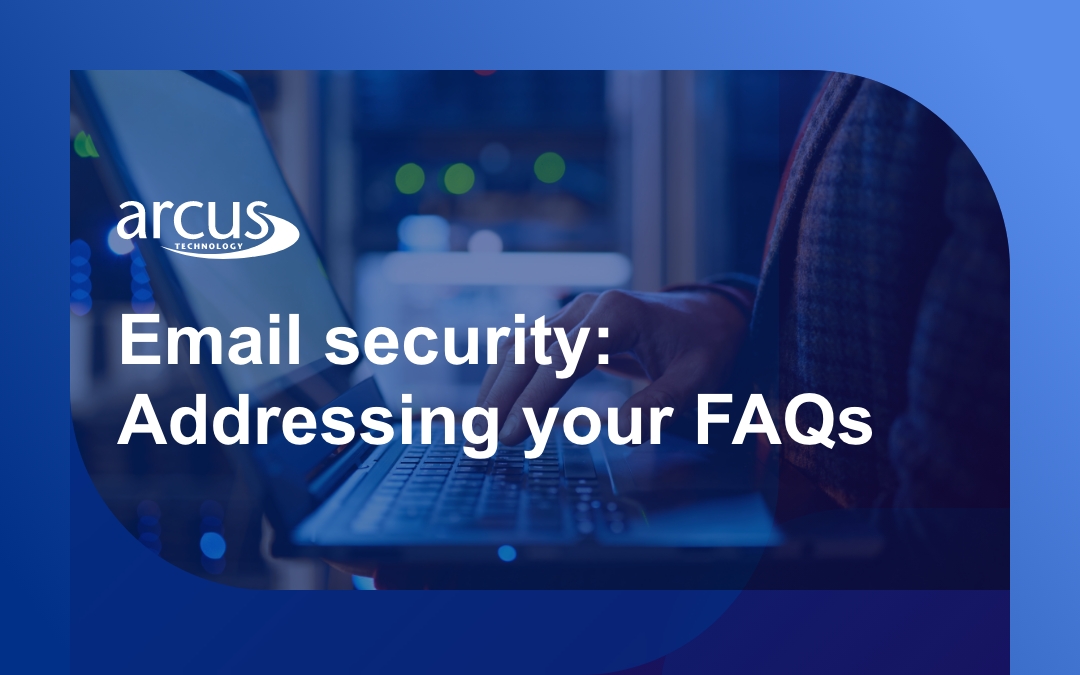Email is a core part of our digital life, and is an integral part of communication across all industries. Around 347.3 billion* emails are sent and received every day, and in 2019, over half of the world’s population (3.9 billion) used email. This figure is set to increase to 4.3 billion by the end of 2023.
It’s no surprise that emails are a desirable target for cybercriminals. Securing your email is no longer an option but a must. Organisations need to exchange data securely and comply under GDPR guidelines – if you’re sending highly sensitive data via email, would you do it without security in place? What are the consequences if sensitive data arrives in the wrong inbox?
Securing emails not only protects a business from potential threats but also against human error.
In this article, we’re taking a look at the common topics surrounding email security.
Common email security threats
Threats come in all shapes and sizes, and I’m sure you will have heard of them, or unfortunately actually been directly affected by one. Threats such as phishing attacks, malware attachments, email spoofing, and unauthorised access to an email account leave people vulnerable to security breaches. Account holders are regularly being tricked into revealing sensitive information, opening attachments which compromise a system and steal data, or they’re allowing attackers to forge a sender’s identity.
Why email security is important?
When there are billions of emails sent and received daily around the globe, and email usage is that important, there’s no argument against having email security in place. Emails are a prime target for cybercriminals for many reasons. Phishing emails are a common occurrence and cyber-attacks are continually evolving in sophistication. When you combine this with human error, you’ve got some solid reasons for the need to have high-quality email security.
Criminals have a lot to gain from an email attack or breach of account and they’re only going to keep finding ways to gain access to sensitive and valuable data.
What is email security?
Like any form of security, procedures and techniques need to be put in place to keep things secure, which is no different with email. Email security may vary depending on the software and security steps a user puts in place.
One of the first points of security everyone gets faced with is login credentials. Whether it’s in the form of a password, pin, fingerprint, facial recognition, or a mixture of any of these, it’s a key step deterring unauthorised access to an email account.
How do you protect your business from email related cyber threats?
There are various steps to take to protect your business from an email attack.
To help protect our customers, Arcus Technology offer JustMail 2.0, powered by Vade Secure**.
Combining the power and intelligence of AI and people, JustMail crafts a cybersecurity partnership, which performs analysis of email and webpage behaviours. This analysis detects advanced threats which go may under the radar of other solutions, including, phishing, spear phishing, malware and ransomware attacks.
It’s good practice to implement a multi-layered approach to email security. Introducing policies to employees around passwords and email security is sensible. Many employers introduce this to their employees through an initial induction process, but it is an area that should be revisited, with some recommendations saying short refresher training needs to take place. Ideally, this would happen once a month to minimise the risk of human error.
Phishing training
Providing users with training to recognise, and effectively manage phishing attempts, and malicious attachments results in minimising the risk of a breach.
Vade Threat Coach™*** offers Automated Phishing Training, which alerts users when they interact with a phishing email. When the incident happens, Threat Coach presents the user with a short quiz to assess their phishing awareness.
This solution addresses the problem of one-off phishing training being detached from real life situations. This approach to phishing training not only gives it a purpose but delivers it at a time when the user needs it.
Is encryption necessary for email security?
Encryption can play a vital role in your email security, by ensuring the content of your emails remains unreadable to unauthorised recipients.
Encryption scrambles the content of your emails, and only becomes accessible by an intended recipient with the decryption key. Implementing encryption will maintain confidentiality and protect you from sharing sensitive data with the wrong person.
Encryption is an ideal choice for industries who regularly need to share highly sensitive data.
Overview of best practices for email security
Here’s a quick rundown of the best practices you can put in place to secure your emails.
- Select a robust email security software
- Ensure your email security offers comprehensive protection
- For seamless operation, use a software that integrates with your existing IT infrastructure
- Regularly educate employees about email security best practices
Supporting your IT demands
Whether you’re a new start-up or a long-standing established business, email security needs to be part of your overall cybersecurity package. As the main choice of communication for many, leaving it unsecure is like leaving a front door wide open for anyone to come in.
As an IT Support Service Provider, we understand the IT demands modern businesses face. Our team can offer you experienced technical support with a thorough understanding of the IT support market. Get in touch with one of our experienced and friendly team today.
*https://www.zippia.com/advice/how-many-emails-are-sent-per-day/
**https://www.vadesecure.com/en/
***https://www.vadesecure.com/en/threat-coach/

